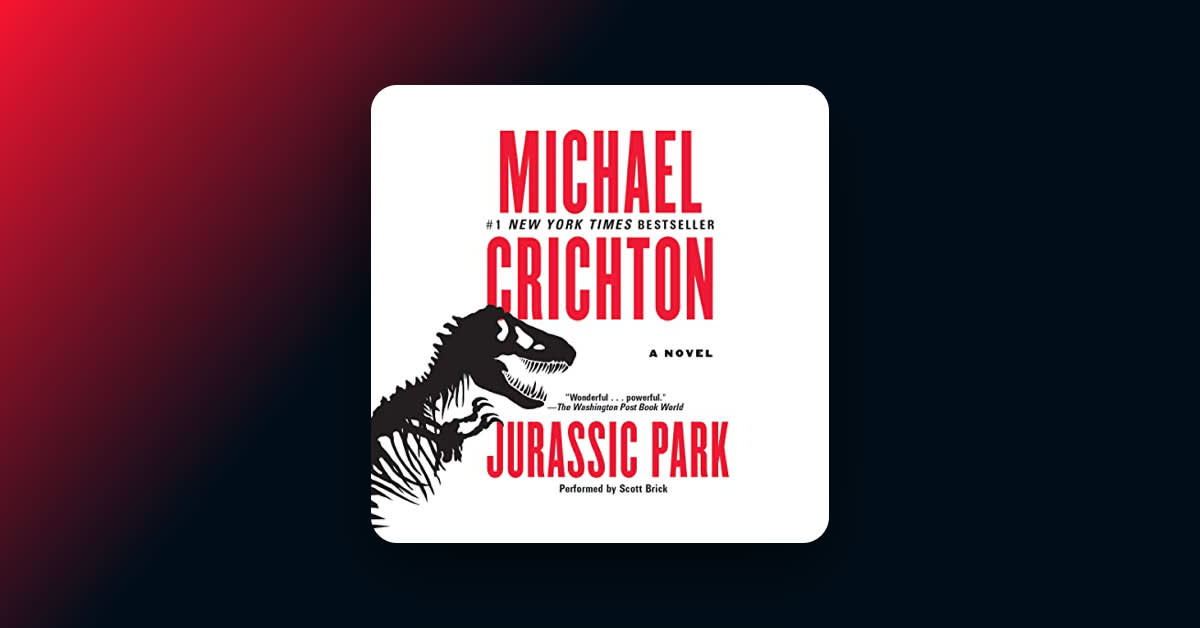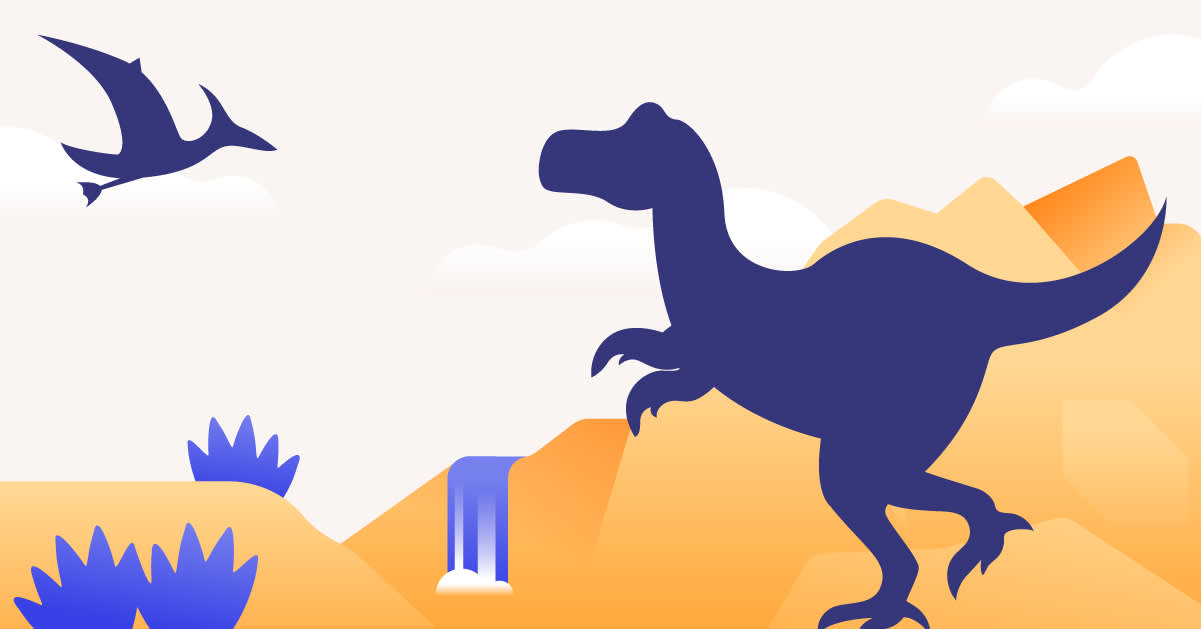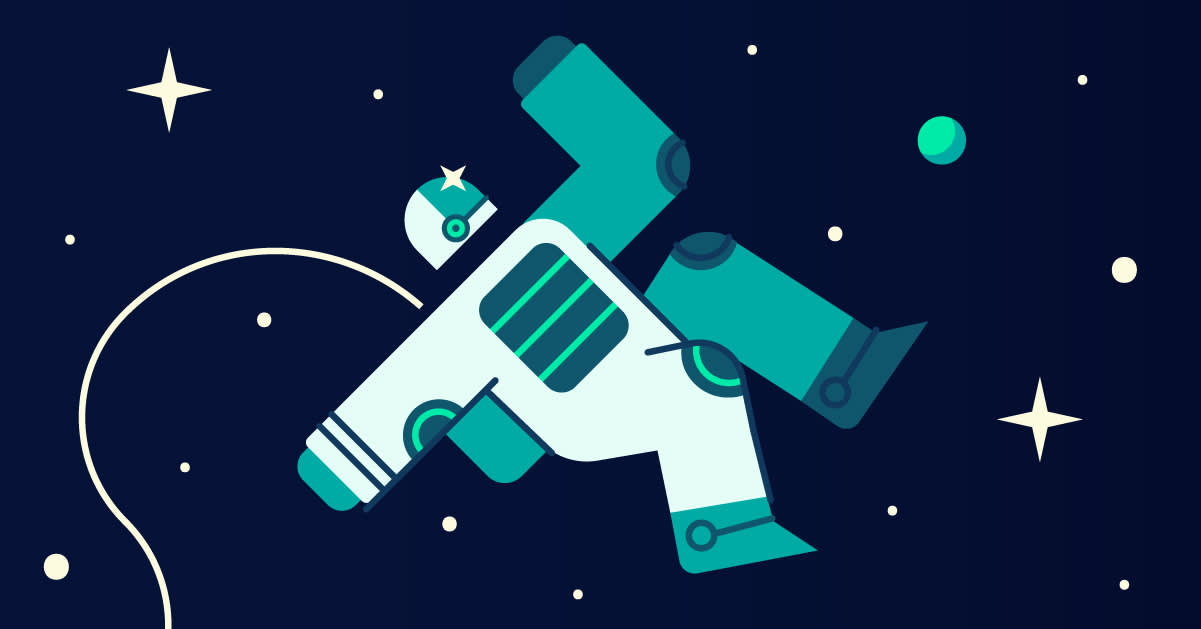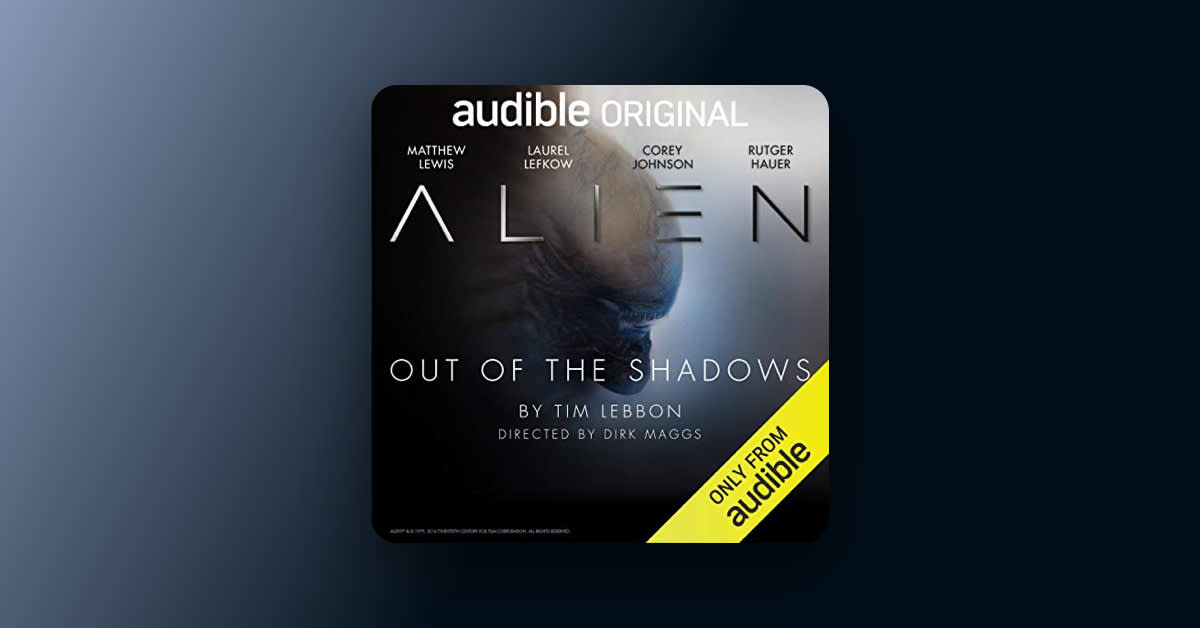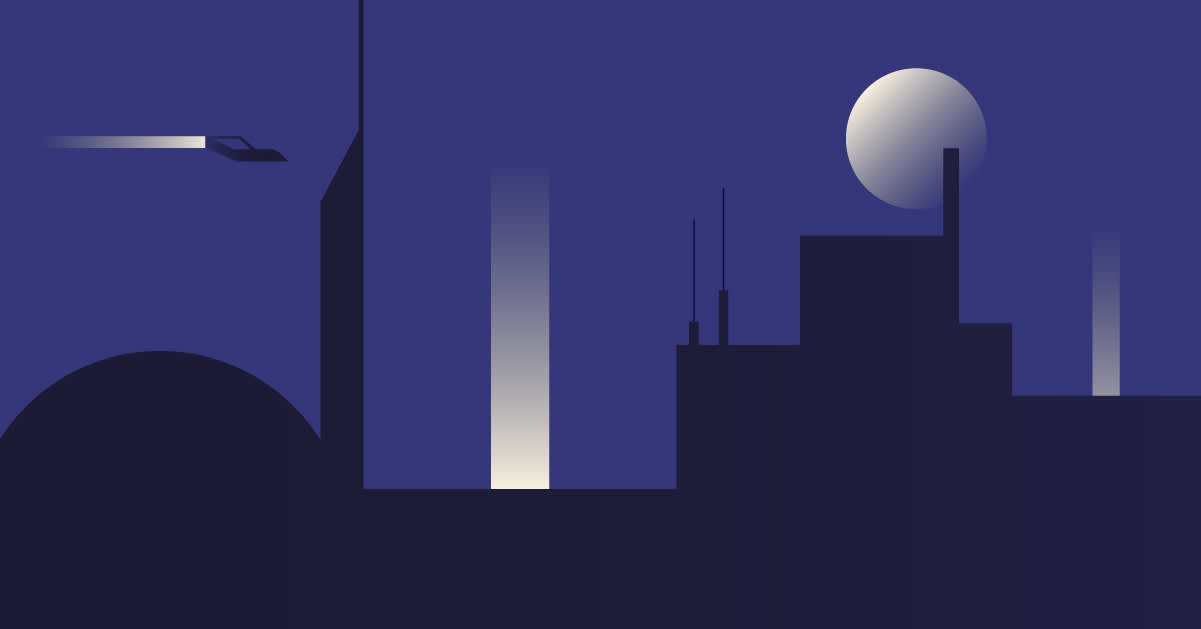Why it's essential
Steven Spielberg’s 1993 blockbuster of the same name proved that this cautionary tale of ambition, avarice, and the commodification of life was a natural fit for film. In audio, Scott Brick’s cool and unnerving narration of this sci-fi classic will get into your head, under your skin, and may even percolate into your dreams.
Featured in The Audible Essentials Top 100 and The Audible Essentials Top 100 Page-to-Screen Adaptations.
What's Jurassic Park about?
Michael Crichton's chilling speculative fiction novel follows the chaos that erupts on a remote site off of Costa Rica after a showboating entrepreneur's attempt to revive dinosaurs for the purpose of consumer entertainment goes horribly wrong. Billionaire John Hammond brings in a team of experts—including paleontologist Alan Grant, paleobotanist Ellie Sattler, and mathematician Ian Malcolm—alongside his own grandchildren to preview his latest venture: Jurassic Park, a new attraction showcasing living, breathing dinosaurs genetically recreated through DNA preserved in fossilized amber. When the park's security systems go down, the resurrected beasts run wild, and the group must fight to survive if they want to make it off the island alive.
Editor's review
Editor Alanna is a proponent of thoughtful storytelling of all kinds—from vulnerable, author-narrated memoir to works of horror and science fiction that meditate on the human condition.
I, like every other millennial, spent my youth equal parts enamored with and petrified by 1993's big screen adaptation of Jurassic Park. It was a cinematic marvel the likes of which I’d never seen before, brilliant story work bolstered by state-of-the-art animatronics and an impeccable cast. And yet, despite the raptors running rampant on Isla Nublar, there was a stark realism to the story, underpinned by a scientific premise that felt distressingly plausible.
Over the years, I’d watch it again and again and again, until I had memorized every line and singular moment, every bleat of the ill-fated goat, every water glass tremor. There was just one problem—now that I knew the film inside and out, I wanted more. And so, the instant I was old enough to get my preteen hands on a copy of the film’s source material, I did just that. (Spoiler alert: I loved it so, so much that I’d later name my own pet dino—okay, fine, bearded dragon, but close enough—"Crichton” in honor of the late author.)
Jurassic Park, Michael Crichton’s groundbreaking sci-fi standout that had inspired that film is speculative fiction as its very best—whip-smart, taut, and unflinching. Not once does the novel lack for something to say, whether it’s on the ethics of science, technology, and ambition or the resultant disaster from unleashing that which we do not fully comprehend into the world. Upon reading it for the first time, I was instantly struck by the effectiveness of the novel’s blend of minute high-tech, cerebral detail and flashes of graphic body horror, all strung together with a tight, suspenseful narrative. Throughout, there is an urgency to the story, conveying a warning about mankind’s hubris that, even three decades after the novel’s initial publication, we perhaps still fail to heed.
Impressively, what remains sharpest about Crichton’s masterwork aren't the teeth of an apex predator or claws sinking into prey. Instead, it’s the author's incisive musing on unfettered capitalism, the inescapable push-and-pull between chaos and control, and the impact of both on the natural world that cuts right to the bone. John Hammond, the founder of the fictional park, is not naïve about the misgivings—he simply does not care about the risks if they yield significant reward. Motivated only by the potential of profit, he is arguably a more effective antagonist than any of the carnivores lurking in the long grass. After all, the escaped dinosaurs are merely acting on instinct—the real destruction is wreaked by man’s attempts to commodify the natural world.
But that’s not to say the prehistoric threats in Jurassic Park don’t hold their own—the very first chapter, which sees a young girl on vacation with her family viciously attacked by a mysterious birdlike reptile (in reality, the small, bipedal dino Compsognathus), immediately sets a chilling tone that never warms throughout the novel. Whether it’s the relentlessly clever Velociraptor lunging from the darkness to hunt down our heroes or the flare-necked, poison-spewing Dilophosaurus that puts an end to one character's corporate disloyalty, the creatures roaming the park are nothing short of terrifying. Crichton doesn’t skip a single vicious detail either, underscoring not just the ethical implications but the deadly consequences of attempting to manipulate the inherently unpredictable process of evolution and all that is wild.
Hearing this novel in audio for the first time was like experiencing this world, though so familiar and so beloved, anew. Scott Brick brings an exquisite gravitas to the novel, his voice a looming specter of impending disaster. His performance is level, slow and steady, until it reaches a fever pitch, mirroring the suspense that builds with each savage primeval encounter. His performance emphasizes that Crichton’s timeless cautionary tale of man, beast, greed, and chaos is one that doesn’t just ask to be heard—it demands it. And in an era where we’re having conversations eerily similar to those posed in the novel about rapidly emerging technology, the insidious effects of unbridled capitalism, and the impact the combination of the two will soon have on all our lives, Crichton’s vision feels more pressing (and more advisory) than ever before.
Did you know?
Michael Crichton's first draft of the novel was told from the perspective of a child—a young boy experiencing the crisis at the park firsthand—but his trusted early readers weren't a fan of this POV. Eventually, he was persuaded to shift the story to an adult's vantage point, and the rest is history.
Crichton received his MD from Harvard Medical School in 1969 but chose to pursue writing in lieu of practicing medicine. Nonetheless, his scientific expertise shines in novels like Jurassic Park, The Lost World, The Andromeda Strain, and Prey.
Crichton was also hired to adapt his novel for the big screen, co-writing the screenplay for the 1993 film of the same name with screenwriter and filmmaker David Koepp.
It seems Jurassic Park was destined for fame—a bidding war ensued and the rights for adapting this sci-fi great were snatched up before Crichton even finished writing the novel.
What listeners said
"Jurassic Park is probably one of the books I keep highest on my review pedestal. I was a little worried that going back to it more than 10 to 15 years after first reading it ... that it wouldn't have the same edge. I couldn't have been more wrong. I knew that Crichton could write. I knew he was innovative, writing about powerful computers in books like Jurassic Park and Congo before they were even on the horizon. But I forgot just how good Crichton was at holding my attention. Jurassic Park STILL gave me goosebumps years later. It still had me hiding under the covers and wondering what would happen next. If you are one of those people who think, 'Is the book really that much better?': Yes, yes, yes. A thousand times over, yes." —Brian, Audible listener
"Gripping from start to finish. Scott Brick is by far the best narrator I’ve heard so far ... The book itself is engaging, thought-provoking and harrowing. I found myself absorbed in the world, imagining vividly what it would be like to be in their place. Crichton’s writing is inspired and caused me to have to pause and rewind the story many times because I would get lost in thought over the concepts he explores. I will be listening to as many of his novels as I can, as he has shot to the top of my list of great authors. I would recommend this to fans of the movies, as well as fans with an interest in science, ethics and, of course, dinosaurs." —Elizabeth W., Audible listener
"My all-time favorite. Everyone has their 'the book': the book that hooks them on reading, [and] Jurassic Park is mine. I’ve reread the same battered old paperback every summer since I was 10, [and] it never gets old. I never thought I’d purchase this audiobook because I didn’t think it would have the same effect. I was wrong. Even though I know the book so well, Scott Brick’s masterful narration pulled me in and had me at the edge of my seat." —12345, Audible listener
Quotes from Jurassic Park
“Because the history of evolution is that life escapes all barriers. Life breaks free. Life expands to new territories. Painfully, perhaps even dangerously. But life finds a way.”
“The planet has survived everything, in its time. It will certainly survive us.”
“Living systems are never in equilibrium. They are inherently unstable. They may seem stable, but they’re not. Everything is moving and changing. In a sense, everything is on the edge of collapse.”
“All major changes are like death ... You can't see to the other side until you are there.”
“You know what's wrong with scientific power? It's a form of inherited wealth."
"The planet is not in jeopardy. We are in jeopardy. We haven’t got the power to destroy the planet—or to save it. But we might have the power to save ourselves.”
"If we are gone tomorrow, the Earth will not miss us."
“And entertainment has nothing to do with reality. Entertainment is antithetical to reality.”
"Real life isn’t a series of interconnected events occurring one after another like beads strung on a necklace. Life is actually a series of encounters in which one event may change those that follow in a wholly unpredictable, even devastating way.”
"He finally decided that children liked dinosaurs because these giant creatures personified the uncontrollable force of looming authority. They were symbolic parents. Fascinating and frightening, like parents. And kids loved them, as they loved their parents."
Listeners also love
About the author
After graduating from Harvard Medical School, Michael Crichton embarked on a career as a writer and filmmaker. His credits include The Andromeda Strain, Westworld, Jurassic Park, Rising Sun, Prey, State of Fear, and the TV series ER. He has sold over 150 million books, which have been translated into 36 languages; more than a dozen have been made into films. He was the only person to have had, at the same time, the number one book, movie, and television show in the United States.
About the performer
Scott Brick's accessible, popular, and often relatable voice invites you into the story and takes you along for the ride. That ride can be in any number of genres, from nonfiction to sci-fi, fantasy, mystery, or suspense. Some of his big early splashes were with Nelson DeMille’s The Lion’s Game, Ron Chernow’s Alexander Hamilton, Frank Herbert’s Dune, and Orson Scott Card’s Ender’s Game series. He’s won numerous Audie Awards, including two in 2016 for his performances of Jurassic Park and The Patriot Threat. His many other lauded performances include John Grisham's The Firm, Tom Clancy's The Hunt for Red October, Erik Larson's The Devil in the White City, Jon Krakauer's Under the Banner of Heaven, and Philip K. Dick's Blade Runner.
About Jurassic Park's pop culture legacy
Beginning with Steven Spielberg's 1993 movie masterpiece, the world and characters that Michael Crichton created in Jurassic Park have inspired a massive multimedia media franchise that spans seven films, two animated series, an abundance of video and board games, and a horde of toys—as well as a multitude of theme park attractions. And it continues to grow! Beyond the undeniable allure of dinosaurs, it's evident that there's just something about this series—including its universal, sci-fi-defining themes and its awe-inducing scope—that ensures its intergenerational popularity and longevity.
In July 2025—35 years after Michael Crichton's original Jurassic Park novel was first published—the seventh film in the franchise, Jurassic World: Rebirth roared onto the big screen to excited a new generation. It stars Scarlett Johansson, Mahershala Ali, and Johnathan Bailey and is helmed by director Gareth Edwards. Plus, David Koepp, the first Jurassic's co-screenwriter, returned to work on Rebirth, promising a return to the "dread and fear" of the original film, while focusing on a cast of new characters in a previously unexplored location. For diehard fans of the novel, this latest installment also nods to a scene from Crichton's original story that Spielberg was forced to cut from the first movie: a T. rex river raft chase sequence that puts major characters in mortal peril.
